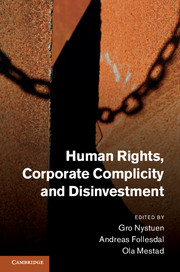Book contents
- Frontmatter
- Contents
- Note on the contributors
- Referenced case law
- Acknowledgements
- 1 Introduction
- 2 Disinvestment on the basis of corporate contribution to human rights violations: the case of the Norwegian Government Pension Fund
- 3 Laws, standards or voluntary guidelines?
- 4 Responsibility beyond the law?
- 5 Attribution of responsibility to listed companies
- 6 Responsibility for human rights violations, acts or omissions, within the ‘sphere of influence’ of companies
- 7 Human rights investment filters: a defence
- 8 The moral responsibilities of shareholders: a conceptual map
- 9 Sovereign wealth funds and (un)ethical investment: using ‘due diligence’ to avoid contributing to human rights violations committed by companies in the investment portfolio
- 10 Corporations and criminal complicity
- Appendices
- Bibliography
- Index
- References
9 - Sovereign wealth funds and (un)ethical investment: using ‘due diligence’ to avoid contributing to human rights violations committed by companies in the investment portfolio
Published online by Cambridge University Press: 07 October 2011
- Frontmatter
- Contents
- Note on the contributors
- Referenced case law
- Acknowledgements
- 1 Introduction
- 2 Disinvestment on the basis of corporate contribution to human rights violations: the case of the Norwegian Government Pension Fund
- 3 Laws, standards or voluntary guidelines?
- 4 Responsibility beyond the law?
- 5 Attribution of responsibility to listed companies
- 6 Responsibility for human rights violations, acts or omissions, within the ‘sphere of influence’ of companies
- 7 Human rights investment filters: a defence
- 8 The moral responsibilities of shareholders: a conceptual map
- 9 Sovereign wealth funds and (un)ethical investment: using ‘due diligence’ to avoid contributing to human rights violations committed by companies in the investment portfolio
- 10 Corporations and criminal complicity
- Appendices
- Bibliography
- Index
- References
Summary
Introduction: New kids in town
‘Governments are very different from other economic actors. Their investments should be governed by rules designed with that reality very clearly in mind.’
This introduction consists of two parts. The first part situates sovereign wealth funds within the international monetary and financial system. The second sets the stage for the specific angle from which this contribution has been written, and introduces the questions it seeks to address.
Sovereign wealth funds as actors in the international monetary and financial system
Over the last five to ten years, sovereign wealth funds (SWFs) have come to be perceived as the new giants of the international monetary and financial system. While the 2008 international financial crisis has left its impact felt upon the depth of their pockets, they surely represent forces which need to be reckoned with for the decades to come. The mainstream assumption underlying any debate about SWFs, indeed, seems to be that SWFs are not only there to stay, but that they are also bound to grow.
As a consequence, international financial markets – along with those at the political level having the capacity to regulate these markets – are starting to realize that SWFs’ growth may lead to a situation in which the world as they know it may possibly be a thing of the past.
- Type
- Chapter
- Information
- Human Rights, Corporate Complicity and Disinvestment , pp. 183 - 221Publisher: Cambridge University PressPrint publication year: 2011
References
- 2
- Cited by



